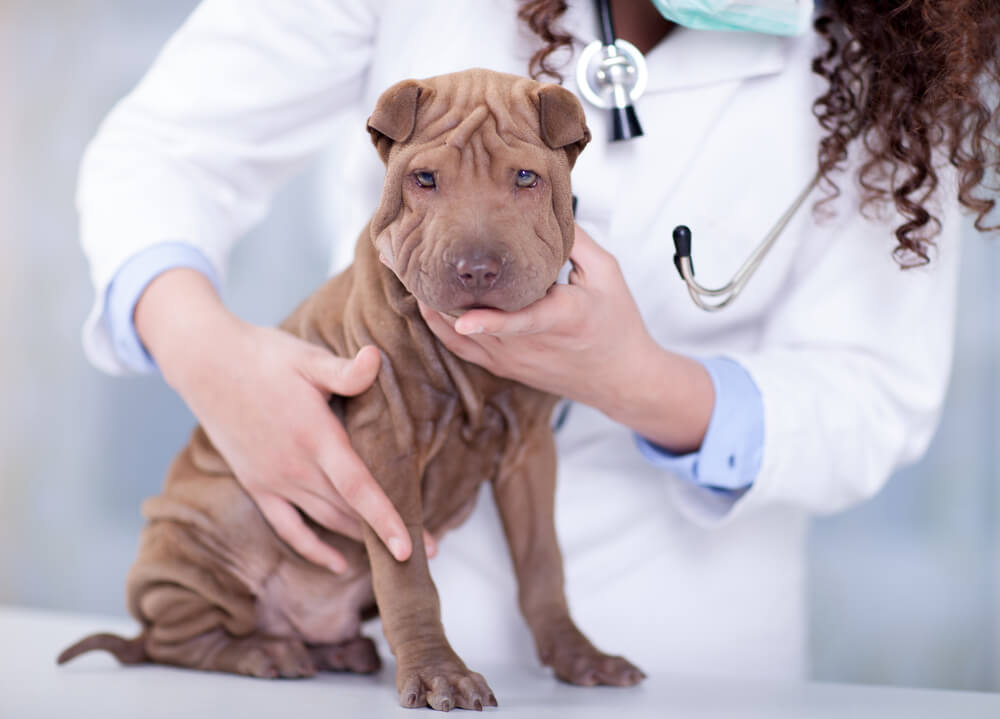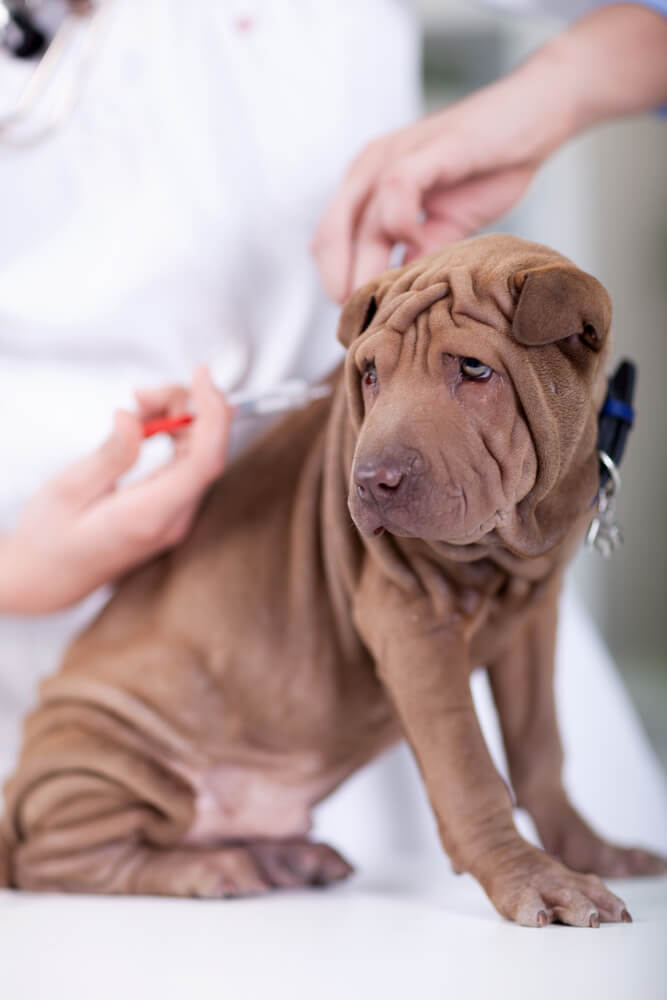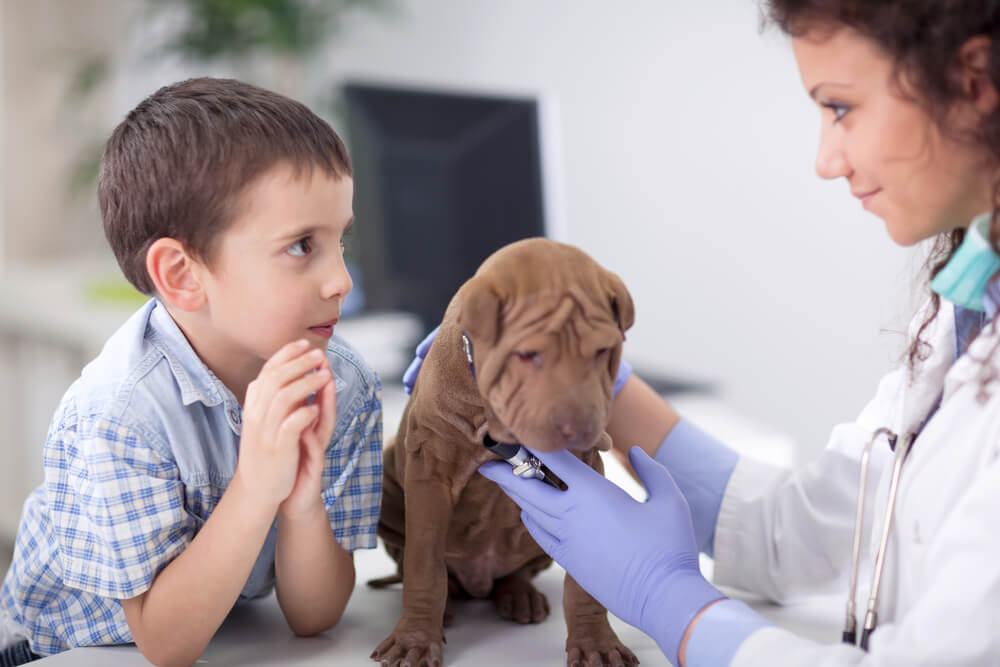Have you ever wondered if your Shar Pei is sick? It can be hard to tell since they’re so good at hiding their pain. But there are some subtle signs that your dog may be feeling under the weather. Here are a few things to watch for:
The Importance of Regular Check-Ups for Your Shar Pei
Regular check-ups for your Shar Pei are paramount to ensure the health and longevity of your furry friend. These check-ups allow the vet to closely monitor the overall health of your dog, including its weight, teeth, coat condition, and more.
Early detection of potential health problems like Shar-Pei fever, kidney disease, or skin infections can be facilitated by these blood tests and regular visits. Many of these ailments, if caught early, can be more effectively managed or even cured.
Furthermore, routine check-ups also provide an opportunity for your vet to administer necessary vaccinations and advise on diet and lifestyle modifications that can greatly improve your Shar Pei’s quality of life.

Understanding the Shar Pei Breed: Its Unique Anatomy and Health Challenges
The Shar Pei breed is a wonderfully unique and loyal breed with its distinctive wrinkles and round, hippo-like snout. However, these unique traits also bring about certain health challenges. Their deep wrinkles, while adorable, can create a damp and warm environment conducive to bacterial growth and subsequent skin infections.
Their stout snouts can sometimes cause breathing difficulties, a condition often referred to as Brachycephalic Syndrome. Additionally, Shar Peis are genetically predisposed to certain ailments such as Shar Pei – Fever syndrome and kidney disease. Understanding these unique characteristics and potential health issues can better equip owners to care for and monitor the health of their Shar Peis.
How To Maintain a Healthy Diet for Your Shar Pei
Maintaining a healthy diet for your Shar Pei is crucial in keeping them healthy and preventing diseases. A balanced diet rich in high-quality proteins, vegetables, and grains is essential. Make sure to avoid giving them food that is too rich or fatty as this could lead to pancreatitis.
Food allergies are also common in Shar Peis, so be mindful of any changes in their behavior or physical condition after introducing new foods. If in doubt, always consult your veterinarian who can provide professional advice tailored specifically to your dog’s needs. And remember, keep treats to a minimum to prevent obesity, which can put additional strain on their joints and organs.
Common Misconceptions About Shar Pei Health
There are several misconceptions about Shar Pei health. One of these is that Shar Peis are naturally sickly or unhealthy due to their wrinkled skin and unique anatomy. While Shar Peis are predisposed to certain health conditions, they are not inherently unhealthy dogs.
With the right care and preventative measures, they can live long, healthy lives. Another misconception is that Shar Peis are low-maintenance dogs. On the contrary, their unique features require specific care, especially their skin folds, which require regular cleaning to prevent infections. It’s essential to dispel these misconceptions so as not to deter potential Shar Pei owners or misguide current ones.
Understanding the Genetics of Shar Peis: Why are They Prone to Certain Ailments?
Shar Peis have a unique genetic makeup that makes them more prone to certain health conditions. These include the likes of Shar Pei Fever, a serious condition caused by an overactive immune response, and Familial Shar Pei Fever (FSF) a genetic mutation that can lead to amyloidosis, a condition that leads to kidney and liver failure.
Their wrinkly skin can also predispose them to certain skin conditions, such as bacterial infections, yeast infections, and dermatitis. Understanding these genetic predispositions can help owners anticipate potential health issues and take preventative measures to ensure the health and happiness of their Shar Pei.

How to Create a Stress-Free Environment for Your Shar Pei
Creating a stress-free environment for your Shar Pei can contribute significantly to their overall health and well-being. A regular routine can help manage stress, as Shar Peis often thrive on predictability.
Keeping the home environment quiet and calm can also reduce stress levels in your Shar Pei. Since Shar Peis can be a bit reserved and often prefer quieter environments, try to limit loud noises and sudden changes in their surroundings.
Providing plenty of toys and mental stimulation can prevent boredom and anxiety. Lastly, ensure your Shar Pei gets plenty of exercise and has a comfortable place to rest and retreat to when they need quiet time. This will keep them happy, secure, and reduce the chance of stress-related health problems.
Emergency Signs in Shar Peis: When You Should Immediately Contact a Vet
As a Shar Pei owner, it’s crucial to know the emergency signs that warrant immediate veterinary attention. These signs include but are not limited to excessive vomiting or diarrhea, difficulty breathing, fainting or sudden collapse, seizures, signs of severe pain like whimpering or aggressive behavior when touched, and signs of Shar Pei Fever like a sudden high fever and swollen hocks.
In addition, any clinical signs of significant behavior changes, loss of appetite or drastic weight loss, or increased drinking and urination can also be cause for concern and should be addressed promptly with your veterinarian.
The Role of Exercise in Preventing Illness in Your Shar Pei
Exercise plays a critical role in preventing illness in your Shar Pei. Regular exercise helps maintain a healthy weight, which is vital in preventing obesity-related issues such as diabetes and joint problems. Physical activity also helps keep their heart healthy and their muscles strong.
Exercise can also aid in digestion and help prevent constipation, a common issue in Shar Peis. Moreover, exercise is excellent for your dog’s mental well-being and can help prevent behavioral issues caused by boredom or anxiety. Make sure the level of exercise is appropriate for your Shar Pei’s age, health status, and energy level.
Shar Pei Skin Care: Tips to Prevent Skin Issues and Infections
Shar Pei’s unique wrinkles make them more susceptible to skin issues and infections. Regular cleaning of these wrinkles is vital to prevent bacteria build-up that can lead to infection. Use a gentle, hypoallergenic wipe to clean each fold and make sure to dry them thoroughly afterward, as moisture can create a breeding ground for bacteria.
Regularly check for signs of redness, swelling, or unpleasant smells as these may indicate an infection. Regular bathing with a gentle shampoo can also help maintain healthy skin. Always consult with your vet if you notice any skin abnormalities or if your Shar Pei develops a skin infection.
Dealing with Behavioral Changes in Shar Peis: Could It Be a Sign of Illness?
Behavioral changes in your Shar Pei could potentially be a sign of illness. If your normally active and playful Shar Pei suddenly becomes lethargic or uninterested in activities they usually enjoy, it could be a sign they are not feeling well.
Changes in eating or drinking habits, an increased risk of aggression or fearfulness, or other unexplained behavior changes can also be indicative of health issues. Always take note of any drastic changes in behavior and consult with your vet, as this could be your first clue that your Shar Pei is not feeling their best.

Long-Term Care and Considerations for Aging Shar Pei
As your Shar Pei ages, their care needs will change. Older Shar Peis may be more susceptible to arthritis, vision and hearing loss, dental problems, and other age-related health issues. Regular vet check-ups become even more critical during this time to catch and manage these issues early.
Your vet may recommend changes to your Shar Pei’s diet to accommodate their changing nutritional needs and potentially aid in managing certain health conditions. Physical exercise remains important but may need to be adjusted to be gentler on aging joints. Mental stimulation, such as puzzles and interactive toys, can also help keep an
older Shar Pei’s mind sharp and prevent cognitive decline. Regular grooming and skin care are crucial to prevent skin issues that aging Shar Peis may be prone to, and increased dental care can help prevent oral health issues. It’s also important to provide a comfortable resting place that caters to an older dog’s needs, for instance, orthopedic beds for those with arthritis.
Lastly, providing your aging Shar Pei with plenty of love and attention will help maintain their emotional well-being as they navigate their golden years.
Shar Pei Hygiene: How to Properly Clean Your Dog’s Wrinkles to Prevent Health Issues
Shar Peis are known for their adorable wrinkles. However, these folds require regular cleaning to prevent skin infections and other health issues. Dirt, moisture, and bacteria can accumulate in these wrinkles, leading to infections and irritation.
When cleaning your Shar Pei’s wrinkles, use a gentle, hypoallergenic wipe to gently clean each fold. Avoid using anything that could be abrasive or cause irritation. After cleaning, make sure each wrinkle is thoroughly dried, as any remaining moisture can encourage bacterial growth.
If you notice any signs of infection such as redness, swelling, or an unpleasant smell, contact your vet promptly. By regularly maintaining your Shar Pei’s hygiene, you can prevent many common health issues and keep your dog comfortable and happy.
What are the signs of Shar Pei fever?
Shar Pei fever is a pretty common issue in these unique wrinkle-faced pooches. Symptoms of Shar Pei fever can vary, but typically the most obvious sign to look out for is a persistent high temperature. Other signs affected shar pei, can include lethargy, a show of pain when their wrinkles or ears are touched, and loss of appetite.
Generally speaking, any strain of fever lasting over 24 hours should be looked at by a vet. Owners must educate themselves on the subtle signs of Shar Pei fever as it can progress quickly and become more serious if left untreated. Keep an eye on your pooch’s behavior and never ignore any worrying symptoms.
What triggers Shar Pei fever?
Shar Pei fever is a condition that shar pei dogs are prone to getting. It occurs when the dog’s immune system is set off by an irritant, most often some type of bacteria. When this happens, the dog becomes very warm and may even begin to experience severe joint pain due to inflammation. Treatment may involve antibiotics or anti-inflammatory medications prescribed by your veterinarian, depending on the severity of inflammatory disease and the fever.
Shar Pei fever can be prevented if owners opt for regular check-ups with their vet and keep their pets in good health through diet, exercise, and vaccinations. Additionally, taking steps to keep the pup clean and dry helps reduce the chance of the condition developing–so make sure to give them those baths!
How can I treat my Shar Pei fever at home?
Taking care of a Shar Pei can be difficult, but one of the most common ailments owners face is Shar Pei fever. This is caused by an excess of histamines in your pet’s system which will cause atypical symptoms like a raised temperature, reduced appetite, and overall dehydration.
Fortunately, treating this fever at home is within reach; start by giving your animal plenty of water and if possible offering them ice cubes since the cold helps reduce their temperature.
If that does not work you may need to give them an anti-inflammatory drug like Benadryl or Zylkene to bring down the worsening symptoms. Make sure to keep your Shar Pei away from other pets or people until you are certain the fever has calmed down, as this will help prevent it from spreading.
What are common ailments in Shar Pei?
Shar Pei is a loyal and loving breed of dog, but just like any other dog, they can be prone to certain ailments. Shar Pei suffers due to their deep facial wrinkles, which can lead to skin infections and eye conditions such as entropion and glaucoma. They may also experience difficulty breathing because of their unique anatomy.
Skin problems like cysts, allergies, pemphigus foliaceus, and even obsessive-compulsive licking are common in Shar-Pei as well. With proper care and attention from a veterinarian though, these issues can be addressed promptly and effectively.
What are the signs of kidney failure in Shar Pei?
Shar Pei is susceptible to several genetic issues, and one of the most serious is kidney failure. Although it can present differently in individual dogs, there are some classic signs of this affliction.
Dogs exhibiting kidney failure may urinate more frequently and drink abnormally large amounts of water. They also tend to have decreased appetites, sudden weight loss, and unusually bad breath.
As the ailment progresses, it can lead to problems with coat quality and coughing as well as more severe issues such as physical weakness and skin rashes. Recognizing kidney failure in a Shar Pei can be difficult, but if you do notice unusual changes in behavior or anything else that seems off, it’s essential to visit a veterinarian right away for testing and treatment.
Final Thoughts and Takeaways: Signs of a Sick Shar Pei
To sum up, it’s important to pay attention to the signs that your Shar Pei may be sick to catch serious illnesses early. Keep an eye out for panting and pacing, changes in behaviors, running away from you or being clingy, loss of appetite, strange lumps or bumps on the skin, bleeding from any part of the body, sudden changes in behavior like aggression, or even sudden silliness.
If your Shar Pei displays any of these symptoms then take them to the vet promptly – they may just need a simple round of antibiotics or they may have a more serious underlying condition that needs treatment. It’s best not to wait if you suspect something is amiss.
Prevention is better than cure – try and keep your Shar Pei’s environment stress-free and monitor their diet closely as this can go a long way towards avoiding potential problems down the line. Be sure to observe regular vet check-ups to ensure your Shar Pei stays healthy for many happy years to come!














